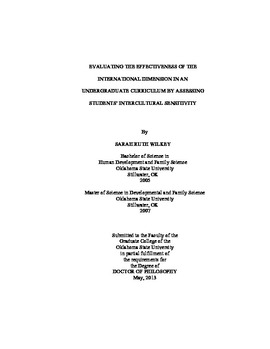| dc.contributor.advisor | Miller, Janice | |
| dc.contributor.author | Wilkey, Sarah Ruth | |
| dc.date.accessioned | 2014-09-24T14:16:47Z | |
| dc.date.available | 2014-09-24T14:16:47Z | |
| dc.date.issued | 2013-05 | |
| dc.identifier.uri | https://hdl.handle.net/11244/10995 | |
| dc.description.abstract | This evaluation research revealed that students' intercultural sensitivity (IS) scores did not change regardless of the type of class in which the student was enrolled. IS scores were not significantly different based on gender, age, ethnicity, undergraduate classification, college enrollment, and number of 'I' courses taken. There were no significant interactions for ethnicity x OSU cultural event participation, college enrollment x the number of'I' courses taken, and parent culture x OSU cultural event participation. There were significant differences in IS scores based on religion, traveling outside the US, participating in a study abroad course, and the number of cultural events in which the student had participated. There was a significant interaction effect for living outside the US x traveling outside the US, indicating that for students who had never lived outside the US, IS scores were significantly higher for those that had traveled outside the US than for those who had not. | |
| dc.description.abstract | IS scores were significantly correlated with the number of 'I' courses and study abroad courses, the number of times traveled outside the US, the number of cultural events participated in, and religious affiliation. Gender, age, ethnicity, classification, and number of times lived outside the US were not significantly correlated with IS. Regression analysis confirmed the set of variables that were positively correlated with IS scores accounted for 11.1% of the variability in ISS scores, with religious affiliation and number of times traveled outside the US being significant predictors of IS scores. | |
| dc.description.abstract | Course characteristics were considered for analyses regarding their effects on intercultural sensitivity scores. Using criterion coding, regression analysis determined IS scores varied as a function of course characteristics, and course prefix was a significant individual predictor of ISS scores. | |
| dc.description.abstract | Finally, students' answers indicated that they did not attribute their opinions of other cultures, interactions with others, participation in cultural activities, and ability to work with others to the classes they took. Students did not believe the courses they took changed the way they thought about people from other cultures. | |
| dc.format | application/pdf | |
| dc.language | en_US | |
| dc.rights | Copyright is held by the author who has granted the Oklahoma State University Library the non-exclusive right to share this material in its institutional repository. Contact Digital Library Services at lib-dls@okstate.edu or 405-744-9161 for the permission policy on the use, reproduction or distribution of this material. | |
| dc.title | Evaluating the effectiveness of the international dimension in an undergraduate curriculum by assessing students' intercultural sensitivity | |
| dc.contributor.committeeMember | Perry, Katye | |
| dc.contributor.committeeMember | Montgomery, Diane | |
| dc.contributor.committeeMember | Henry, Carolyn | |
| osu.filename | Wilkey_okstate_0664D_12656.pdf | |
| osu.accesstype | Open Access | |
| dc.type.genre | Dissertation | |
| dc.type.material | Text | |
| thesis.degree.discipline | Research, Evaluation, Measurement and Statistics | |
| thesis.degree.grantor | Oklahoma State University | |
